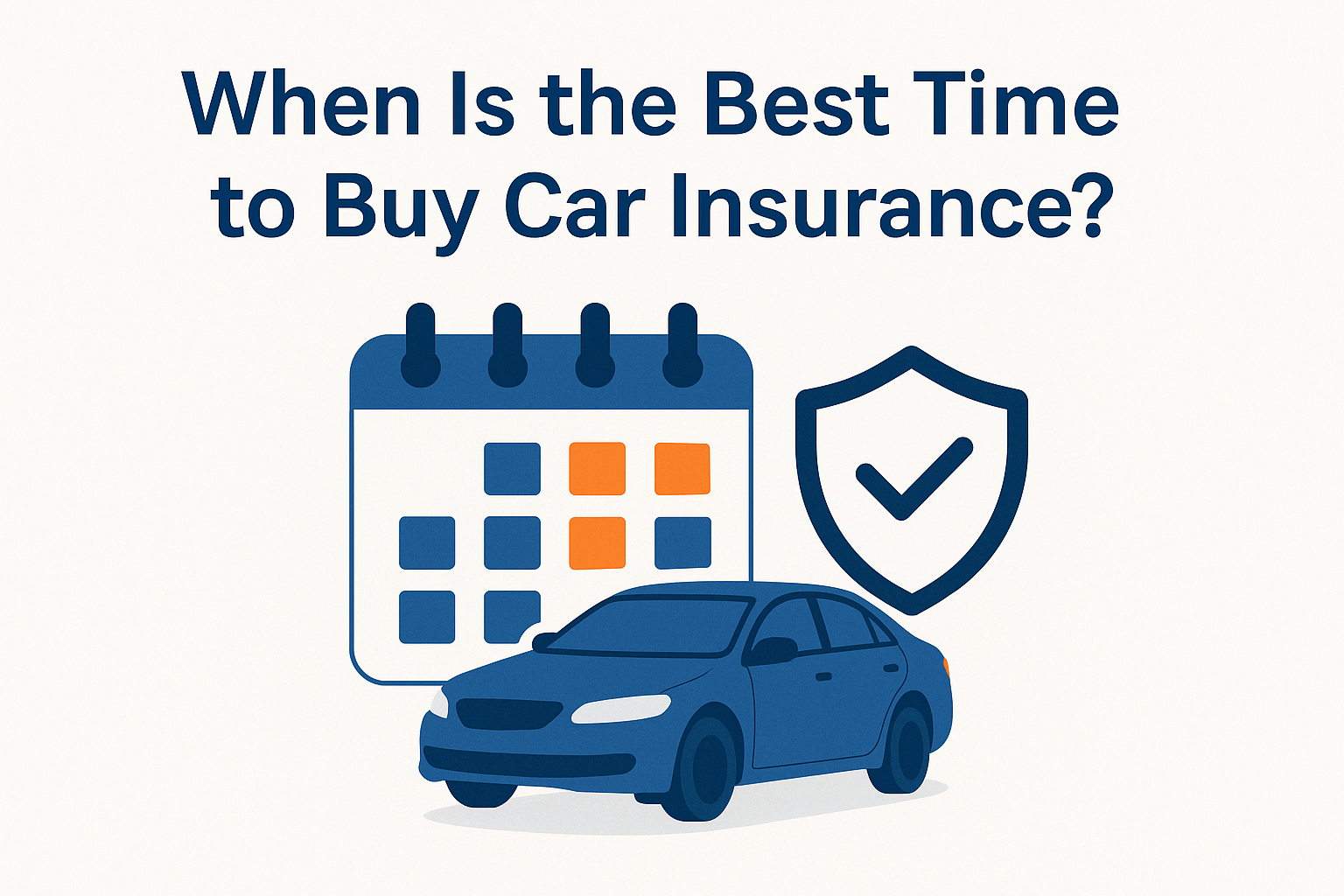When Is the Best Time to Buy Car Insurance? A Comprehensive Guide
Understanding Car Insurance Basics
What is Car Insurance?
Car insurance is a contract between you and an insurance company that provides financial protection against accidents, theft, and other damages. When you pay your premium, the insurance company agrees to cover specific costs associated with car-related incidents, helping you avoid significant out-of-pocket expenses.
Types of Car Insurance Coverage
Understanding your coverage options is key to choosing the right policy:
- Liability Coverage: Covers damages you cause to others in an accident.
- Collision Coverage: Pays for damage to your car after a crash, regardless of who is at fault.
- Comprehensive Coverage: Protects against non-collision incidents like theft, vandalism, or natural disasters.
- Uninsured/Underinsured Motorist Coverage: Offers protection if you’re involved in an accident with someone who lacks sufficient insurance.
- Personal Injury Protection: Covers medical expenses for you and your passengers, regardless of fault.
Common Car Insurance Terms Explained
Familiarity with essential insurance terms can empower you during your purchasing journey:
- Premium: The amount you pay for your insurance policy.
- Deductible: The amount you must pay out of pocket before your insurer covers the remaining costs.
- Policy Limit: The maximum amount your insurance will pay for a covered claim.
- Exclusions: Situations or conditions not covered by your policy.
Factors Influencing the Timing of Insurance Purchase
Personal Life Changes
Significant life events can trigger a need for new car insurance coverage:
- Buying a Car: Getting a new vehicle often prompts the purchase of a new policy.
- Moving: Relocating may require adjustment in coverage, as rates can differ based on location.
- Changes in Employment: Starting a new job might lead to commuting changes impacting your insurance needs.
Knowing the best time to buy car insurance can save you money, provide better coverage, and give peace of mind while driving, and several factors influence this timing, starting with renewal periods and policy expirations, as purchasing or renewing your policy close to the expiration of your current plan ensures continuous coverage
often allows you to compare rates from multiple providers to find the best deal; next is life changes or major events, such as buying a new car, moving to a different state, or adding a teen driver to your policy, which often requires updating your insurance, and this is an ideal moment to shop around because insurers may offer special discounts for new circumstances, helping you maximize savings without sacrificing protection;
another important factor is market timing and seasonal trends, since insurance rates can fluctuate throughout the year, with many experts suggesting that shopping in the months when insurers offer promotions or when competition is high—such as at the start of the calendar year or during industry sales periods—can lead to lower premiums, especially if you bundle policies like home and auto insurance together; credit scores and personal finances also play a role,
because many insurance companies consider your credit history when determining rates, so purchasing insurance after improving your credit score or paying off debts can reduce your premium, making timing a strategic financial decision, while also ensuring you are eligible for loyalty or safe-driver discounts; regulatory and state changes can affect rates too, as new laws regarding minimum coverage, accident forgiveness, or other state mandates often cause insurers to adjust their pricing, making it smart to buy or renew your policy when the market has stabilized after such changes,
avoiding sudden premium hikes; finally, it’s critical to consider comparison shopping and research time, as jumping into a policy without evaluating multiple insurers, reading reviews, and understanding coverage options may result in paying more than necessary, so taking the time to study deductibles, coverage limits, and optional add-ons before committing allows you to choose the optimal moment to buy insurance, ensuring both affordability and comprehensive protection; by combining these considerations—policy renewal timing, life events,
seasonal market trends, personal financial health, regulatory changes, and thorough research—you can strategically decide the best time to purchase car insurance, turning what seems like a routine task into a well-timed financial and protective advantage for every journey you take on the road.
Second, life changes or major events can dictate the optimal time to buy insurance, such as when you purchase a new vehicle, move to a different state, add a teen driver to your household, or even experience changes in your marital status, as these events often trigger adjustments in your insurance needs; insurers may offer discounts or incentives for new circumstances, such as safe-driving programs for new drivers or bundling discounts for multiple policies, making it advantageous to explore options immediately following significant life events rather than waiting for your current policy to renew.
Third, seasonal trends and market timing play a role, as car insurance premiums can fluctuate throughout the year, with certain months, such as January or during industry promotional periods, often offering better deals due to increased competition between insurers or changes in underwriting practices; savvy drivers can take advantage of these seasonal trends, especially when combined with special offers or promotional discounts, to secure coverage at a lower cost while also ensuring that all necessary features, like roadside assistance or rental reimbursement, are included.
Fourth, your personal finances and credit history can influence the ideal timing, since many insurers consider credit scores when calculating rates, meaning that purchasing insurance after improving your credit score, paying off debts, or consolidating financial obligations can lead to lower premiums; understanding the financial aspects of insurance timing also includes evaluating deductibles, payment plans, and long-term savings strategies, as selecting the right moment based on your financial health can save hundreds, or even thousands, of dollars over the life of a policy.
Fifth, regulatory and state-level changes in insurance laws must be considered, as new mandates, minimum coverage requirements, or accident forgiveness programs often cause insurers to adjust their pricing structures; buying insurance immediately after such regulatory changes may lead to higher premiums, so waiting until the market stabilizes can be more cost-effective, and staying informed about local insurance regulations ensures you are compliant while still finding the best possible rate.
Finally, comparison shopping and thorough research are essential, because rushing into a policy without evaluating multiple providers, reading reviews, understanding coverage inclusions and exclusions, and assessing optional add-ons may result in overpaying or underinsuring yourself; taking the time to study different plans, consult online resources, and possibly even speak with insurance agents allows you to determine the best moment to purchase a policy, ensuring both affordability and comprehensive protection.
By combining all these factors—renewal periods, life changes, seasonal trends, personal finances, regulatory shifts, and diligent research—you can strategically determine the best time to buy car insurance, transforming what might seem like a routine transaction into a well-timed, financially savvy, and protective decision that safeguards you on every journey you take, offering peace of mind and financial security while navigating the unpredictable nature of the road.
Seasonal Variations in Insurance Pricing
Insurance premiums can vary with the seasons.
- Winter Weather: More accidents can lead to higher premiums in winter months. Consider purchasing insurance in late spring or early summer when rates often dip.
- New Year: Many companies adjust their rates, and shopping around in January can bring better deals.
Economic Trends and Their Impact on Premiums
Economic conditions can influence insurance pricing.
- Market Competition: During economic downturns, insurers may lower rates to attract new customers.
- Legislation Changes: New regulations can affect premiums, making it vital to stay informed.
Optimal Timing for First-Time Buyers
Factors to Consider When Buying Your First Policy
As a first-time buyer, consider the following factors:
- Coverage Needs: Think about how much protection you really need based on how often you drive and your budget.
- Research Discounts: Look for discounts that may apply to new drivers or students.
Common Mistakes First-Time Buyers Make
First-time buyers often overlook important details:
- Skipping Comparison Shopping: Not comparing rates from different insurers can leave you paying more.
- Ignoring Policy Details: Focusing solely on premiums without understanding coverage may lead to unexpected costs later.
Benefits of Purchasing During Specific Times of the Year
Timing your purchase can be advantageous:
- End of Month Quotas: Many agents work on monthly sales goals, so shopping at the end of the month may yield better deals.
- Avoiding Tax Season: After April, many people experience lower financial stress, potentially leading to more competitive pricing.
Best Times for Policy Renewal
Understanding the Renewal Process
Take note of how your renewal process works:
- Automatic Renewals: Some insurers renew policies automatically unless you cancel. Ensure you review the policy terms before renewing.
- Check Your Renewal Notice: A few weeks before the renewal date, your insurer should send you renewal terms.
Signs It’s Time to Shop Around for Better Rates
Be proactive about your renewal:
- Policy Increase: If your premium has increased without any change in your coverage, consider shopping around.
- Life Changes: Any significant changes in your life might affect your eligibility for discounts or better rates.
How to Prepare for Your Renewal
As your renewal date approaches, prepare by:
- Gathering Information: Check your current policy details and gather any relevant changes in your car use or lifestyle.
- Getting Quotes Ahead of Time: Start comparing rates at least a month before your renewal.
When to Consider Switching Insurance Providers
Evaluating Your Current Policy
Take a close look at your existing policy and pricing:
- Coverage Gaps: Make sure you are adequately covered based on current needs.
- Premium Increases: Higher premiums may warrant a switch to a more competitive provider.
Timing Your Switch for Maximum Savings
Switching at the right time can save you money:
- Mid-Year Shopping: Many companies offer better rates for new customers half-way through their fiscal year.
- After Staying Claims-Free: If you’ve maintained a clean driving record for a year or more, it’s a good time to explore lower rates.
How Life Events Can Influence the Decision to Switch
Life events can provide reasons to reevaluate your provider:
- Marriage or Significant Relationship Changes: Consider combining policies with a partner for better rates.
- New Job or Commute Changes: Changes in your daily travel can impact coverage needs and costs.
Conclusion
- Summary of Key Points: Timing your car insurance purchase and renewal is crucial to saving money and ensuring you have the right coverage. Evaluate your personal circumstances, be aware of market trends, and consider seasonal variations in pricing for optimal results.
- Final Thoughts on Timing Your Car Insurance Purchase: In the ever-evolving landscape of car insurance, understanding when to buy, renew, or switch providers can make a significant difference in your finances. Don’t hesitate to take the initiative—your wallet will thank you!
FAQs
- When is the best month to buy car insurance?
- Late spring and summer often yield lower premiums due to reduced accident risks.
- Should I wait for a sales event to buy car insurance?
- While sales events can offer discounts, doing thorough research and comparing rates year-round is your best bet.
- How does my driving record affect my buying timing?
- A clean driving record often leads to lower premiums, making it smart to shop around for better rates when it’s in your favor.
- Can I get a better rate by changing my policy mid-term?
- Yes, many insurers will offer a refund for unused premiums, and switching may land you a better deal.
- What should I do if I need coverage immediately?
- If you need coverage right away, reach out to providers directly and inquire about instant coverage options.

